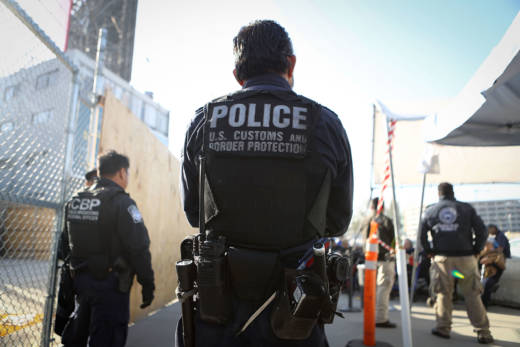The legal services organization Al Otro Lado said it's not unusual for asylum-seeking adults to have U.S.-citizen children after having lived some time in the U.S. For every 20 asylum-seekers who present themselves at ports of entry, at least one has a U.S.-citizen child with them, said Al Otro Lado attorney Erika Pinheiro.
"U.S.-citizen children come with asylum-seeking parents every single day to the border," Pinheiro said.
She said family separations that involve U.S.-citizen children are "worse" than separations that involve only foreign nationals.
Unlike foreign national minors who go into the custody of the Office of Refugee Resettlement, U.S.-citizen children go into foster care unless Child Welfare Services can find them relatives in the U.S. who can take them in. If the child is put up for adoption, a biological parent could permanently lose custody of the child.
One of the children separated recently is a seven-year-old boy who was taken from his Mexican mother at the San Ysidro Port of Entry after the two presented themselves legally and asked for asylum last Thursday.
KPBS is not releasing the family's names because they are escaping an extreme domestic violence situation in southern Mexico, according to Pinheiro, who is providing pro bono services to the family.
But the boy, a U.S. citizen, is with Child Welfare Services in San Diego County and a social worker is having trouble finding a home for him, Pinheiro said. The boy was born in the U.S. while his mother was living here for a few years.
Pinheiro said Customs and Border Protection should have released the mother on parole with a notice to appear in court in order to avoid separating the family. She said that is what usually happens when asylum-seekers enter with U.S.-citizen children, and added that Pinheiro had no prior removal orders or a criminal record.
"They've essentially stripped (this mother) of her parental rights without any due process even though she's followed all the rules," Pinheiro said. "She's sought asylum legally and she should be with her son right now."
Customs and Border Protection did not respond to repeated requests for comment as to why this particular family was separated.
On Wednesday, Pinheiro visited the San Ysidro Port of Entry to determine the status of her client and to request that her client be released on parole for the well-being of her son. Pinheiro was repeatedly denied information despite having filed the necessary paperwork, as witnessed by KPBS.
Customs and Border Protection would not confirm that the woman was in custody at the port of entry. But U.S. Immigration and Customs Enforcement told KPBS she was still with the latter agency, which usually transfers detainees to ICE after a few days.
In a memo on Wednesday, Al Otro Lado told California Attorney General Xavier Becerra that the Department of Homeland Security is violating state child welfare laws and the Flores settlement by continuing to separate families at the border, and asked the attorney general to "intervene to ensure that both parents’ and children’s rights are protected."
Attorney General Becerra's office declined to comment.
In June, about a week after Trump revoked his family separation policy, several states including California filed a lawsuit against the Trump administration stating that separations were an "affront to States' sovereign interests." The lawsuit cited "fiscal impacts" experienced by child welfare services and other state programs.
A day later, a San Diego-based federal judge ordered a stop to family separations and the reunification of nearly 3,000 children separated from parents. Hundreds remain separated in the ongoing litigation. That lawsuit was filed by the American Civil Liberties Union. Judge Dana Sabraw's ruling applies to foreign national parents with foreign national children.
ACLU attorney Lee Gelernt said "the combination of the executive order and the judge's ruling should give the government pause about ever separating a parent and a child, particularly where that child is young and of a tender age."
He added, "If the parent is not a flight risk or a danger in any significant way, the government should be doing everything they can to parole these families so the child does not end up in a child protective services situation or with a foster family. They're doing too much damage to young children by separating families."
